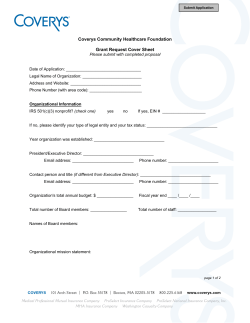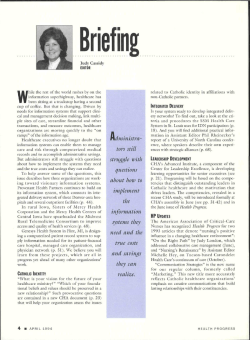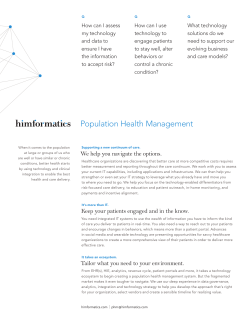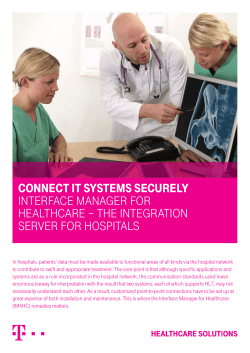
Voicing My ChoiCes™ - Aging With Dignity
. Voicing My Choices LE ™ S A M P A Planning Guide for Adolescents & Young Adults . Voicing My Choices I, _______________________________, ask My Signature: My Date of Birth: Address: Today’s Date: M P Phone: LE that my family, my doctors, my friends, and my health care providers follow my wishes as communicated in this booklet. This booklet is only to be used in the case I can no longer communicate my wishes myself. Witness Statement: I, the witness, declare that the person who signed or acknowledged this booklet is known to me, that he/she signed this booklet based on his/her own thoughts, wishes and desires, and that he/she is of sound mind and under no duress, or undue influence. A Signature of Witness # 1 Printed Name Signature of Witness # 2 Printed Name AddressAddress S Voicing My CHOICES: A Planning Guide for Adolescents & Young Adults helps young people living with a serious illness to communicate their preferences to friends, family and caregivers. Most health care providers want to honor your wishes no matter how you express them. If you are age 18 or older and want your wishes to be legally binding, you should consider completing an advance directive, such as Five Wishes. This planning guide is not meant to give you legal advice. If you have a specific question or concern, talk to a medical or legal professional for advice. 2 . Voicing My Choices When living with a serious illness there are often things in life that are out of your control. Voicing My CHOICES gives you a way to express something very important – your thoughts about how you want to be comforted, supported, treated, and remembered. LE At the end of the booklet, there are some blank pages. On these pages, feel free to share any additional thoughts and wishes not covered in this booklet. You can also use these pages to write letters to friends or family members. Please keep in mind that the topics covered in this book can sometimes be difficult or confusing to think about. Your healthcare providers are available to help explain terms and/or procedures that you may not understand or may have questions about. M P Voicing My CHOICES was developed using feedback from young people living with a serious illness. It is based on the Five Wishes advance directive, which has been used by more than 18 million adults. There are no right or wrong ways to answer the items in Voicing My CHOICES. You can complete as much or as little of this booklet as you would like. There are boxes to check if you agree with certain items, and there is also space to express your thoughts in your own words. Additionally, there is a glossary of terms that may provide clarification for you on page 15. Any term underlined in blue throughout this booklet is defined in the glossary. tM a Sa yW ha A f om tC os eM S u th t, Vo ice Yo 3 ur Thoughts s eed N an d ring You P eac e Yo or My Signature, page 2 My Comfort, page 4 My Support, page 5 My Medical Care Decisions, page 6 My Medical Treatment, page 7 My Family/Friends To Know, page 8 My Spiritual Thoughts, page 9 My Remembrance, page 10 My Belongings, page 11 My Voice (Letters), page 12 Glossary, page 15 sB sion eci es Pr ov id Contents W tD Choose What Y pp eel Su orted, W rite ha s ke F ou Sometimes people can feel very uncomfortable when they are ill. For example, they might have pain, become sleepy or not feel like themselves. It is important for others to know how you want to be treated and what will make you feel more comfortable, especially if you become very ill and cannot express your wishes on your own. How I Want To Be My favorite music/food is: LE My Voice Comforted The kinds of books, stories, or readings I like, are: M P Other thoughts I have about treating my pain, or helping to make me comfortable, are: I would also like: My Choice T he se are a Few of the Com fo rts Impor tant to Me If I look like I am uncomfortable in the following ways: (Please check all that apply) Other things that are important to me are: ☐ If I am not able to get to the bathroom in time, please change my clothes and sheets right away so that I am always clean. If I am in pain, I would like: ☐ My doctor to give me enough medicine to relieve my pain, even if that means I will not be awake enough to interact with my friends or family. ☐ Massages whenever possible as long as they do not cause me discomfort. Or, ☐ To have my favorite foods available. A I want treatment to help me, if I: ☐ Look sad ☐ Am irritable/frustrated ☐ Look nauseated ☐ Look confused ☐ Look like I am having a hard time breathing ☐ Am cold or hot S ☐ If friends are coming to visit, please dress me, comb my hair and do whatever else is needed to help make me look like myself. ☐ To receive medications to reduce my pain but I do not want to be too sleepy or drowsy. I want to be awake enough to interact with my friends and family. ☐ To be bathed. ☐ To have music playing in my room. ☐ To be read to. 4 Whether you are in the hospital or at home, when you are feeling badly or are very ill, there may be times when you want people around you, or you may prefer to not have visitors present. How I Would Like To Be So I Don’t Fee l Alo ne LE My Choice Supported (Please check all that apply) ☐ I do not want to be alone. ☐ I would like my family to be with me whenever possible. ☐ I would like my friends to be with me whenever possible. ☐ I would like visitors whenever possible. ☐ Please always ask me before visiting. ☐ If I am sleeping when someone comes to visit, I would like to be woken up. My Voice M P The people I want with me are: I especially want these people with me when: A The things that I would find comforting to have in my room are: If people are very upset or crying, I would like them to: ☐ Share their feelings with me S ☐ Visit me at another time ☐ Other: When the end of my life is near, I would like: ☐ To die at home ☐ To die at the hospital 5 ☐ Other: Who I Want to Make My Medical Care Decisions If I Cannot Make Them On My Own LE There might be a time when you cannot make medical decisions for yourself. If this happens, it might be necessary for someone else to speak with the doctors and make decisions about your medical care. This person, called a healthcare agent, would make sure that your thoughts or wishes are respected. Things To Consider When Choosing a Healthcare Agent: It can be helpful to choose someone who knows you well, cares about you, lives nearby, and can make difficult decisions. If you are under the age of 18, your parents/ guardians will have legal rights to make decisions, so the person you recommend can be your parents/guardian or someone you would like your parents/guardians to work with. Remember: •• Your healthcare agent must be at least 18 years old. •• Your healthcare agent cannot be your doctor or any of your other health care providers, nor can it be an employee of any your health care providers. •• To talk to the people you are choosing to make sure that they agree to follow your wishes. M P The person I want to make healthcare decisions for me is: First Person Name Address Phone If the person I chose above is somehow unavailable, others who can make healthcare decisions for me are: Second Person Name Third Person Name Address Address Phone Phone S A I give my health care agent permission to make these choices for me about my medical care or services. (Please check all that apply) To allow or refuse: Act on my behalf to: Arrange for: ☐ Test ☐ Hire and/or fire any health ☐ Hospital or hospice admission ☐ Medicines care worker I may need to take ☐ Admission to a facility in another ☐ Surgeries care of me state to get the care I need or to ☐ Other care that can help ☐ See and approve release of carry out my wishes keep me alive my medical records ☐ Hospital discharge to take me home ☐ Medication(s) or procedure(s) ☐ Apply for Medicaid, or insurance benefits for me to help with pain ☐ My healthcare agent is also ☐ Stop previously started treatment ☐ See my personal files, like bank allowed to make decisions based ☐ Donate usable organs and/or records, to access necessary on conversation(s) we have had tissue of mine if it can help others information about my wishes and what he/ ☐ Perform any necessary legal she believes my wishes to be action(s) Other things I wish my health care agent to do are: 6 The types of Life Support Treatment I Want, or Do Not Want If a time comes when you are very ill and not able to speak for yourself, it will be important LE for your health care agent to know whether you would choose to try life-support treatment. Life-support treatment means any medical procedure, device or medication used to try to keep you alive. It can include: medical devices put in you to help you breathe (tracheotomy/ mechanical ventilation); an artificial pacemaker to help maintain your heart-beat; food and water supplied by medical device (tube feeding); cardiopulmonary resuscitation (CPR); major surgery; blood transfusions; dialysis; antibiotics; and anything else meant to keep you alive. No matter what you decide about life-support treatment: M P •• Everything will be done to support you and help you feel comfortable. •• You will always be offered food and fluids by mouth. •• Nothing will be done or omitted with the intention of taking your life. If my doctor and another health care provider both decide that I am close to death and likely to die within a short period of time, and life-support treatment would only delay the moment of my death: If my doctor and another health care provider decide that I have permanent and severe brain damage and I am not expected to get better, and life-support treatment would only delay the moment of my death: ☐ I want to try life-support treatment no matter what ☐ I want to try life-support treatment no matter what ☐ I do not want to try life-support treatment ☐ I do not want to try life-support treatment ☐ I want to try life-support treatment if my doctor believes it could help my symptoms ☐ I want to try life-support treatment if my doctor believes it could help my symptoms A Describe here if you want to try certain forms of life-support treatment, but not others, or if you wish to state other conditions in which you would want, or not want, life-support treatment: S Other decisions I would like respected: In Case of An Emergency life‑support treatment, then a Do Not Resuscitate (DNR) order may be appropriate. Because this is a medical order signed by a doctor, check with your doctor if you think a DNR may be appropriate for you. If you have a medical emergency and ambulance personnel arrive, they will provide all forms of life-support treatment needed to stabilize your condition and bring you to a hospital. If you have a serious illness and are near the end of life and would not want emergency 7 What I Would Like My Family and Friends to Know About Me ☐ ☐ ☐ ☐ It is important to me that my family/friends: Get along Take care of themselves Take care of one another Respect my wishes, decisions and choices even if they don’t agree with them ☐ Get counseling or find a support group for themselves and/or my siblings if they are having a hard time LE My Choice My Voice I want my family to know that I am thankful for their love and support. I am especially thankful for: M P I want my friends to know that I am thankful for their love and support. I am especially thankful for: If I have hurt or upset any of my friends, family or others, I wish to be forgiven for: A When I have been hurt or upset by my family, friends, or others, they should know I forgive them for: S These are the things that are important to know about me: The things that give me strength are: The things that give me joy are: 8 Not everyone has a religion or spiritual beliefs with which they feel connected. Others find great comfort in a faith or a belief system. On this page, you can write down your own thoughts on religion and spirituality, discuss your wishes and indicate what brings you the greatest comfort, in case you are not able to express these wishes for yourself. Spiritual Thoughts and Wishes My Choice LE My ☐ I would not like to have spiritual/religious activities incorporated into my care. ☐ I would like to have spiritual/religious activities incorporated into my care. (Please check all that apply) ☐ I would like people to come pray with me. ☐ I would like members of my religious/ spiritual community to be told about my illness and I would like them to pray for me. ☐ Every day ☐ Once a week ☐ Just when I ask M P ☐ I would like a hospital-based religious leader such as a chaplain, rabbi, priest or pastor to visit me while I am sick. ☐ I would like members of my religious/spiritual community to visit me. The words, music, and/or activities I find comfort from are: My Voice A People from my religious community that I would like to come visit me are: Based on my personal beliefs, I would like people to talk about death or the afterlife as: S The spiritual objects (such as prayer beads, holy books, or figurines) that I would like to have with me are: Other spiritual thoughts or wishes that I would like to share with my family and/or friends: 9 I Wish To Be Remembered How My Remembrance LE If it is more comfortable, you may choose to let others decide about a funeral, a memorial service, and caring for your body after death. Or you can use these pages to voice your preferences. ☐ I prefer not to be a part of planning my service. ☐ I prefer to plan my service. (Please check all that apply) ☐ The type of service(s) I would like are: ☐ Funeral ☐ Memorial service ☐ Celebration of my life I would like: ☐ To be buried ☐ An open casket ☐ To be cremated ☐ A closed casket ☐ To donate my body to science ☐ To be an organ donor A limited autopsy A standard autopsy A research protocol autopsy I would like my healthcare agent to make the autopsy decision M P ☐ ☐ ☐ ☐ The clothes that I would like to be wearing (for service/cremation/burial) are: The items that I would like to be with me are: A The music/food I want at my service are: The people I would like to be present are: S I would like these readings at my service: I would like these other arrangements at my service: If my family or friends want to make contributions or donations I would like them to go to: 10 People in your life will always love you and think about you. There may be LE special ways that you want to distribute your belongings and be remembered, especially on certain days such as your birthday, holidays or any other day that is important to you. This is a page to detail any wishes that you have for how you would like to be remembered for the years after you are gone. As with the other pages, take your time filling this out. Your family and friends will appreciate knowing what you desire and how you would like to be remembered so that they can fulfill your wishes and know that by doing so, they have your special approval. My Belongings w I W o H o s u ld L si ike To T hi Share My Belongings: Clothes: Pets: Books: M P Games: Art: Music: Photographs: Phone: Computer: Other electronics: Furniture: Money/savings: Other belongings: The person I would feel most comfortable going through my belongings is: A Special Days S How I would like to be remembered on my birthday: How I would like to be remembered on other important days: When people ask about me, please say the following: 11 and/or letters to loved ones. S A M P LE My Voice write messages This is a space to 12 13 A S M P LE 14 A S M P LE Glossary Artificial Pacemaker Closed Casket A small battery-operated mechanical device, which uses electrical impulses to keep the heart beating regularly. They can be internal (surgically implanted) or external (attached with wires to the skin). When the casket is closed at a funeral so that those present do not view the body. A standard autopsy is a medical procedure that consists of a thorough examination of your body to determine the specific cause of death or to evaluate any disease or injury. There are 3 types of autopsies: 1) a limited autopsy (a specific part of the body or body system); 2) a full autopsy (studies most organs); and 3) a Research Protocol Autopsy (conducted for research purposes). Blood Transfusion Body/Tissue Donation You can choose to donate either your whole body, or some of your tissue for medical research and education after death. Brain Damage An injury to the brain caused by trauma to the head, infection, hemorrhage (bleeding), inadequate oxygen, or other complications, which results in significant loss in brain functioning or consciousness. A Burial Cremation The process of reducing the body by intense heat. Cremated remains are typically placed in a container (urn) and can be placed or buried at memorial sites or kept by relatives/friends. If you choose to be cremated, it is still possible to have a viewing of your body (open casket) before the cremation process. Dialysis A program used to assist with costs of healthcare. Insurance Benefits Payments or compensation provided to assist with costs of healthcare. A medical treatment in which an artificial filtering system removes waste from the blood, performing the functions of the kidneys if they are not working. Life-Support Treatment Any treatments used to maintain the vital functions of the body in order to sustain the life of someone who is critically ill or injured. Mechanical Ventilation The medical procedure used to aid or replace breathing when someone is unable to breathe on his or her own. A machine called a ventilator forces air into the lungs via a tube that is inserted in the nose or mouth and down the windpipe. M P The process of transferring blood or any of its components into the bloodstream of a person who has lost blood because of illness, an accident or surgery. A state of unconsciousness, lasting more than 6 hours, in which a person cannot be awakened, fails to respond to external stimuli, including pain and light, lacks a normal sleep-wake cycle, and does not initiate voluntary actions. Insurance LE Autopsy Coma outpatient and focuses on maintaining quality of life and symptom control. The act of placing a body into its final resting place. An urn or special container can be used to store remains from cremation. Cardiopulmonary Resuscitation (CPR) S An emergency procedure performed on a person who has no pulse and has stopped breathing. CPR consists of external cardiac massage and artificial respiration (breathing) in an attempt to restore circulation of the blood and prevent death or brain damage. Celebration of My Life A gathering of your family/friends that is planned to honor and celebrate your life. Some choose to have a gathering yearly or just once after their death. Medicaid A federal system of health insurance for those requiring financial assistance. Feeding Tubes Medicare A medical device used to provide nutrition to patients who cannot obtain nutrition on their own. A federal system of health insurance for people over age 65, or qualified young people with disabilities. Funeral Memorial Service A ceremony used to mark a person’s death. A person’s body is typically at the funeral. A service or ceremony performed to honor a deceased person. The body or cremated remains are typically not present. More than one memorial service can be held. Healthcare Agent The person chosen, legally named, or designated under state law to make healthcare decisions on behalf of a person who is no longer able to make his or her own decisions. Healthcare Providers Open Casket When the casket is left open during a funeral in order to allow for a viewing. A mortician at the funeral home will prepare and dress the body for viewing. A person or organization that provides healthcare in any way, including: doctors, nurses, administrators, and other staff who are affiliated with your care or your care facility. Organ Donation Hospice Tracheotomy An organization or facility that provides care for the terminally ill focused on palliation (comfort) when curative treatment is no longer an option. Hospice care involves medical care, pain management, and emotional/spiritual support. It can be provided inpatient or A surgical operation that creates an opening into the trachea (windpipe) with a tube inserted to provide a passage for air in order to help someone breathe. The removal of the tissues (organs) of the body from a person who has recently died to a living recipient in need of a transplant. LE . Voicing My Choices™ M P A Planning Guide for Adolescents & Young Adults was developed by researchers at the Pediatric Oncology Branch, National Cancer Institute and the National Institutes of Mental Health at the National Institutes of Health. The development process included extensive research using the Five Wishes advance directive and incorporating the feedback of adolescents and young adults. Special thanks to Lori Wiener, PhD, in addition to Sima Zadeh, MA; Haven Battles, PhD; Kristin Baird, MD; Elizabeth Ballard, MA; Janet Osherow, LICSW, and Maryland Pao, MD. S A Contact Aging with Dignity to Order more copies of Voicing My CHOICES P.O. Box 1661, Tallahassee, Florida 32302 www.agingwithdignity.org (888) 594-7437 © 2012 Aging with Dignity. All rights reserved. The contents of this publication are copyrighted materials of Aging with Dignity. No part of this publication may be reproduced, transmitted, or sold in any form or by any means, electronic or mechanical, including photocopy, recording, or any information storage and retrieval system, without written permission from Aging with Dignity. While the contents of this document are copyrighted, you are permitted to photocopy the completed pages to provide a copy of your completed Voicing My Choices to your family, health care providers, and caregivers.
© Copyright 2025











